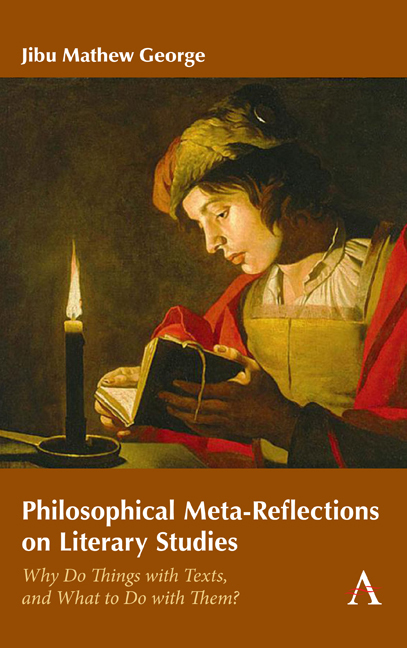 Philosophical Meta-Reflections on Literary Studies
Philosophical Meta-Reflections on Literary Studies Book contents
- Frontmatter
- Dedication
- Content
- Acknowledgements
- Introduction
- 1 The Why and Wherefore of Academic Disciplines: The Humanities and the Human World Process
- 2 If Literature were to Disappear from the Spectrum of Disciplines …
- 3 Beyond for and Against: Tendencies of Contemporary Criticism
- 4 The Aesthetic and the Political
- References
- Index
- Frontmatter
- Dedication
- Content
- Acknowledgements
- Introduction
- 1 The Why and Wherefore of Academic Disciplines: The Humanities and the Human World Process
- 2 If Literature were to Disappear from the Spectrum of Disciplines …
- 3 Beyond for and Against: Tendencies of Contemporary Criticism
- 4 The Aesthetic and the Political
- References
- Index
Summary
This book takes up key meta-questions in the humanities, with a focus on contemporary literary studies, philosophically examines the nature of knowledge therein and addresses the effervescent question of ‘relevance’. Its subtitle is a variation on the title of M. H. Abrams's collection of essays and reviews Doing Things with Texts (1989), which in turn echoes J. L. Austin's influential work How to Do Things with Words (1955). Effective research and teaching in any discipline depend upon being able to understand its raison d’être and the modes of reasoning possible in it. Chapter 1 endeavours to articulate a philosophical rationale for the existence of the humanities with reference to what it calls the human world process. The purpose of theory and philosophy lies in offering a conceptual grasp on the world and a clarification of our implicit assumptions. The chapter argues that knowledge in the humanities is of a different order from that in the sciences and so is its social relevance. Humanistic knowledge has broader subjective and cultural bases and demands articulation of its connections to the ‘real’ world, to everyday life. The chapter presents a critique of the minimalist criterion of knowledge, and enunciates possibilities of crossfertilization between the academic and the experiential, making a distinction between reflective and implementational intelligence – a distinction reinforced by a fallacy of cognitive ease. Regardless of apprehensions concerning ‘grand’ concepts, the larger terrain of the humanities is the human world process and the cognitive, cultural, linguistic, interpretive and representational dynamism that endeavours to grapple with the process. The process far exceeds the cognitive, cultural, linguistic, interpretive and representational strategies that seek to capture it. As such, knowledge in the humanities, at least more so than is the case with knowledge of physical objects, is only an abstracted version of the process. Further, a characteristic of knowledge in the humanities is that they largely deal with intangible entities, and necessitate an ontology of the intangible. The humanities, having had the reputation of a ‘soft’ discipline, also evince scientistic aspirations, as demonstrated by the popularity of impersonal systems and codes in the study of literature and culture.
- Type
- Chapter
- Information
- Philosophical Meta-Reflections on Literary StudiesWhy Do Things with Texts, and What to Do with Them?, pp. 1 - 4Publisher: Anthem PressPrint publication year: 2019


